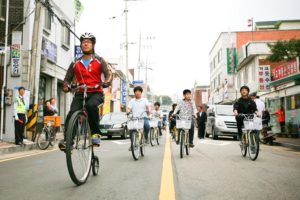
EcoMobility World Festival 2013 was the world's first month-long presentation of an innovative and forward thinking urban transportation culture. The Haenggungdong neighborhood of Suwon, South Korea was temporarily converted into an “ecomobile neighborhood”, presenting a real-life vision of car-free urban living for the future. EcoMobility is travel through integrated, socially inclusive, and environmentally-friendly transport options, including and integrating walking, cycling, wheeling, and passenging.
In September 2013, over 4,300 neighborhood residents adopted an ecomobile lifestyle for an entire month. Instead of driving private automobiles, residents of all ages and from all walks of life made their daily commute to work or school, trips to the shops and to leisure activities using a combination of their feet, pedal power, and light electric vehicles. With the help of the city administration, the neighborhood was redesigned for people, instead of cars.
To pull off this unprecedented experience, extensive preparatory works were underway since 2011. A program of workshops, consultations and EcoMobility training was designed to involve residents in the planning of the month-long event. At the beginning of the consultation process, the Festival idea was met with a mixture of enthusiasm, curiosity, concern, and opposition from residents. 240 city officials went door-to-door to address concerns and explain the Festival plan. As a result, by the time the Festival began, over 1,000 residents had joined the Haenggung-dong Residents’ Group, which played a crucial role in coordinating the public’s participation in the Festival.
The Festival provided an opportunity for the underdeveloped Haenggung-dong neighborhood to undergo infrastructural improvements. Based on residents’ needs identified in a 2012 survey, Suwon City committed to create livable streets in the neighborhood. The sidewalks of the main streets were widened to three meters on each side, improving walkability while sewerage infrastructure was upgraded and overhead cabling was buried. EcoMobility-themed street furniture was installed in green pocket parks which appeared in the newly reclaimed public spaces.
Long-term Impacts
At the end of September when this pilot project came to its completion, Suwon City passed on the baton to the residents. Numerous appraisal sessions and round-table discussions between the city and the residents took place after the Festival to discuss the future mobility policy of the EcoMobility Neighborhood. At the final round-table discussion, the community outlined their priorities for the continuation of ecomobile neighborhood.
The Festival developed local and international awareness on the value and feasibility of the ecomobile city model. Thanks to the support of strong leadership and engaged community participation, the month-long experiment proved that any neighborhood can transform into an area where pedestrian and cyclist activity flourishes, in a bold departure from car-centric urban design.
Two years later, the festival atmosphere in the streets of Haenggung-dong is gone but the sidewalks are still busy with pedestrians. Cars have made a noticeable return, although residents say there are fewer of them and drivers go slower. Walking the streets myself, I noticed that traffic here was much less busy than on some of the clogged streets just outside the car-free zone of 2013.
Shutting the streets entirely to cars seems unlikely anytime soon — Mayor Yeom says that goal will have to wait three or four years. But residents have begun requesting incremental changes that nudge Haenggung-dong in that direction.
For example, community members fought for and won a city ordinance that limits car speeds to 30 kph in the neighborhood’s streets. (National law does not allow for speed limits lower than that.) The community also has begun holding car-free Saturdays once a month on Gongbang Street, one of the busiest streets in the neighborhood lined with restaurants and art shops. Hwang Yeong, a 51-year old community leader who initiated the car-free Saturdays, says it’s a “small step” toward reviving the experience of the month-long festival two years ago. Next year, Hwang’s group — in partnership with the city government — will hold the car-free Saturdays twice a month. He hopes to make it weekly by 2018.
One businessperson who has noticed the difference is Cho Ehwa, owner of a traditional Korean restaurant along Hwaseomun Street. Cho says it was financially painful to close shop for the façade renovations, but business took off during the festival and hasn’t slowed since. Before, she served about 200 customers in a typical day; now that is up to 250 and can reach 300 customers on a good day.
“I thought when we removed cars, there would be fewer customers,” recalls Cho. “Actually, more people came into the shops as more people walked in the streets.”
Cho and others pointed to a social benefit of the festival and the car-free Saturdays that followed. As ICLEI’s Park says, when more citizens walk, they engage in simple chit chat that quietly builds community. “Walking connects people in the cities and helps build the social capital essential to resilient communities,” says Park.
Sources
Project Cost Description
Suwon city government invested US$10.5 million in the endeavor. In addition to hosting the festival itself, the money was spent on infrastructure improvements such as widening sidewalks, introducing traffic-calming curves into roadways and burying utility cables underground. Vacant lots were turned into pocket gardens. The city even provided biking lessons to residents of Haenggung-dong.
Some of the money was spent on renovating façades of worn-out buildings — all those people strolling in the streets would need something nice to look at. The building facelifts required some ground-floor businesses to close for four months.